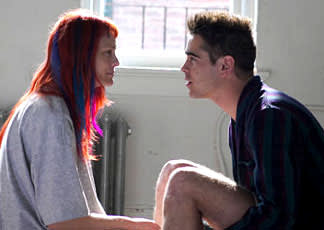You've probably read it in the gossip pages but If not, let me sum it up: Colin Farrell went full frontal in A Home at the End of the World and test audiences got "distracted." Faster than you can say "snip, snip," Farrell's offending au naturale footage is excised like tissue for biopsy. It's a shame, really. This stilted, directionless movie could have used a few good distractions.
All questions of anatomy aside, Farrell is a capable actor and is certainly likeable as the enigmatic, sexually ambiguous Bobby Morrow. Problem is, Bobby is so enigmatic that neither Farrell nor director Mayer have any idea how to portray him. It feels as though Mayer has made two films with two different sets of characters: one, set in 1974, focuses on the teenage Bobby (Erik Smith) and his quasi-adopted brother Jonathan (Harris Allan). Here, Bobby shows an otherworldly Zen confidence. He's clearly a messed-up kid by the time he turns 15 his brother and both parents are dead but you get the sense he'll skate through life on his wildly self-possessed charisma. He even charms Jonathan's straight-laced mom (Sissy Spacek) into trying a little weed. (The sight of Spacek taking a double-handed toke in her June Cleaver outfit is the highlight of the film.)
Yet Farrell plays the adult Bobby as a well-meaning dimwit. Saddled with a terrible mullet wig, and with mouth agape, he could pass for a grown-up Joey Jeremiah if you stuck a fedora on his head. The years Bobby spent with a loving family should have given him an extra shot of confidence. Instead, he's a sluggish loser still stuck in suburban Cleveland. Meanwhile, Jonathan (Dallas Roberts) is living an openly gay life in New York with flamboyant gal pal Clare (Robin Wright Penn, playing way against type).
Given the overall lack of authenticity in character, time, or even place, it's surprising that screenwriter Michael Cunningham (The Hours) also wrote the original 1990 novel of the same name. But the bulk of the blame here goes to Mayer, who sets good actors adrift in a sea of shallow sentiment and muddled motivation. Don't bother seeing this one in a theatre, wait for the DVD instead and see Home at home. I hear the outtakes are pretty good. (Warner Independent)
All questions of anatomy aside, Farrell is a capable actor and is certainly likeable as the enigmatic, sexually ambiguous Bobby Morrow. Problem is, Bobby is so enigmatic that neither Farrell nor director Mayer have any idea how to portray him. It feels as though Mayer has made two films with two different sets of characters: one, set in 1974, focuses on the teenage Bobby (Erik Smith) and his quasi-adopted brother Jonathan (Harris Allan). Here, Bobby shows an otherworldly Zen confidence. He's clearly a messed-up kid by the time he turns 15 his brother and both parents are dead but you get the sense he'll skate through life on his wildly self-possessed charisma. He even charms Jonathan's straight-laced mom (Sissy Spacek) into trying a little weed. (The sight of Spacek taking a double-handed toke in her June Cleaver outfit is the highlight of the film.)
Yet Farrell plays the adult Bobby as a well-meaning dimwit. Saddled with a terrible mullet wig, and with mouth agape, he could pass for a grown-up Joey Jeremiah if you stuck a fedora on his head. The years Bobby spent with a loving family should have given him an extra shot of confidence. Instead, he's a sluggish loser still stuck in suburban Cleveland. Meanwhile, Jonathan (Dallas Roberts) is living an openly gay life in New York with flamboyant gal pal Clare (Robin Wright Penn, playing way against type).
Given the overall lack of authenticity in character, time, or even place, it's surprising that screenwriter Michael Cunningham (The Hours) also wrote the original 1990 novel of the same name. But the bulk of the blame here goes to Mayer, who sets good actors adrift in a sea of shallow sentiment and muddled motivation. Don't bother seeing this one in a theatre, wait for the DVD instead and see Home at home. I hear the outtakes are pretty good. (Warner Independent)
